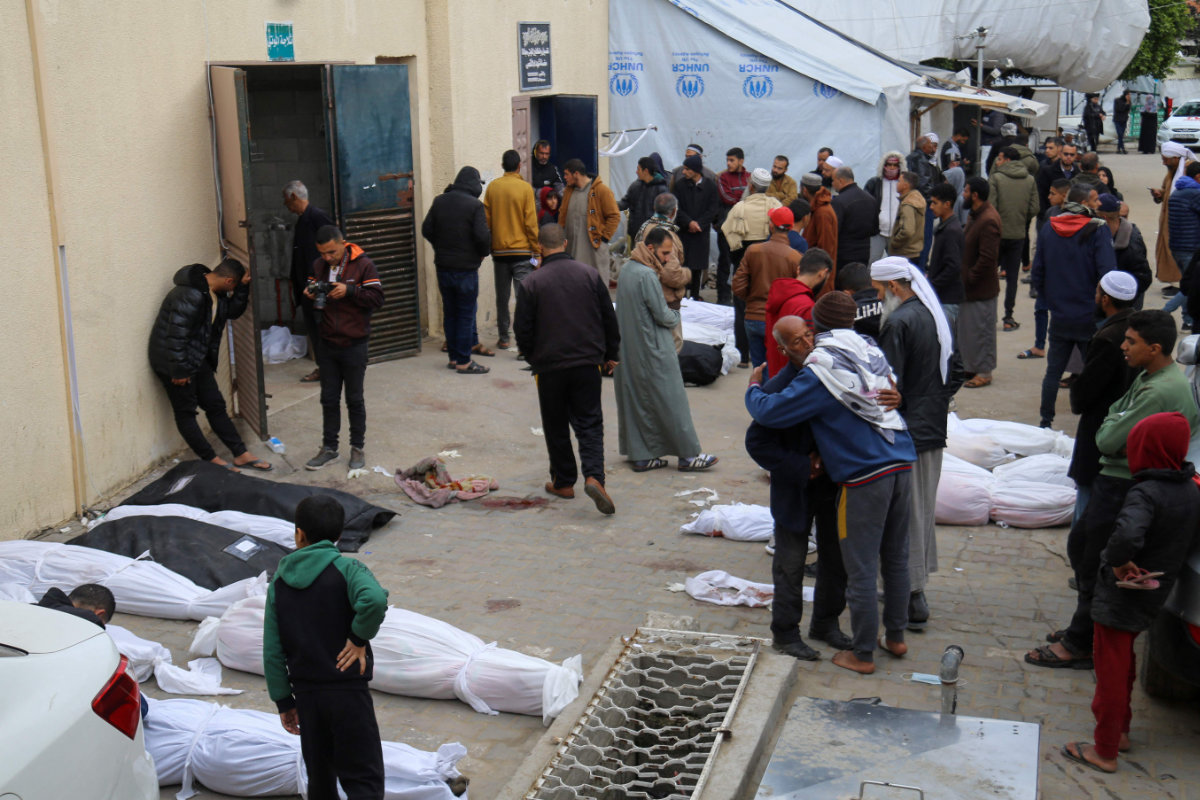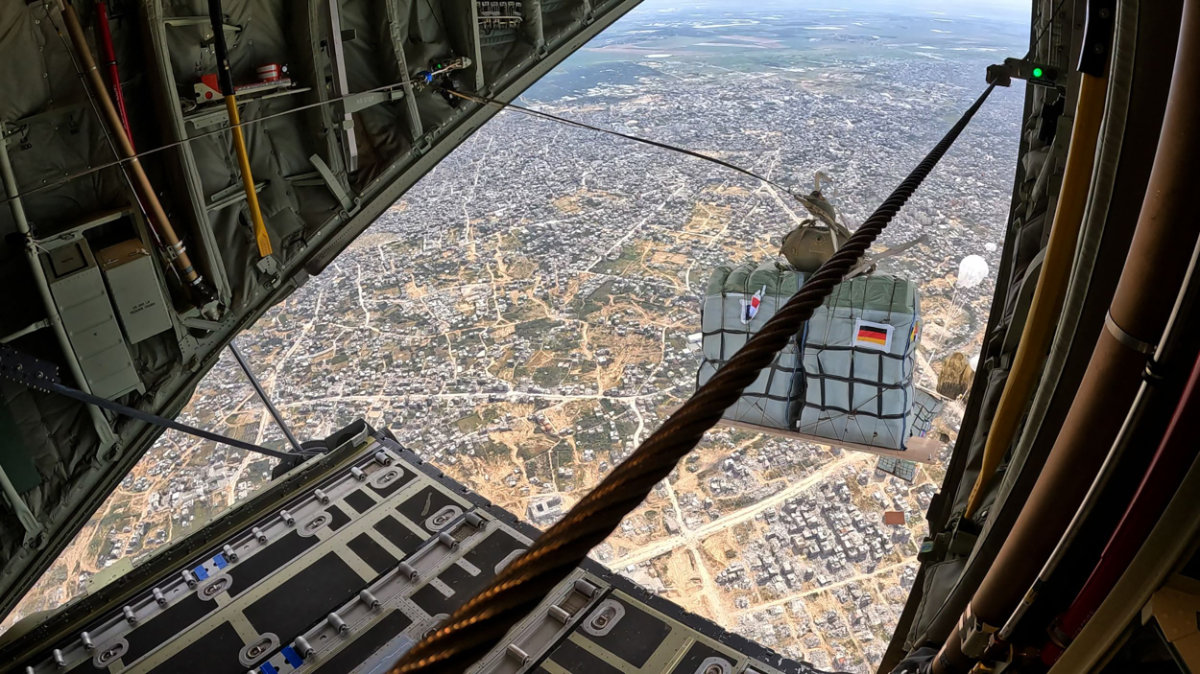CAIRO/GAZA STRIP: Israeli Prime Minister Benjamin Netanyahu said on Sunday he would keep on with the military campaign against Hamas in Gaza, where aid agencies say famine is looming, while ceasefire talks were set to resume.
Netanyahu told a Cabinet meeting that Israel would push into Rafah, the last relatively safe place in the tiny, crowded Gaza enclave after more than five months of war, despite international pressure for Israel to avoid civilian casualties.
“We will operate in Rafah. This will take several weeks, and it will happen,” he said, without clarifying if he meant the assault would last for weeks or would begin in weeks.
“No amount of international pressure will stop us from realizing all the goals of the war,” he stressed.
He later said after meeting German Chancellor Olaf Scholz in Jerusalem that Israel would not leave civilians trapped in Rafah when its forces begin their assault.
Israel’s allies have piled pressure on Netanyahu not to attack Rafah, where more than a million displaced people from other parts of the devastated enclave have sought shelter, without a plan to protect civilians.
US President Joe Biden, whose country provides Israel with billions of dollars in military assistance, has said a Rafah invasion would be a “red line” without credible measures to protect civilians.
UN World Health Organization chief Tedros Adhanom Ghebreyesus urged Israel “in the name of humanity” not to launch a Rafah assault, warning that “this humanitarian catastrophe must not be allowed to worsen.”
Ceasefire deal pressed
At a joint news conference on Sunday, Scholz said he had spoken with Netanyahu about the need to provide comprehensive humanitarian aid to the people in Gaza.
“We cannot stand by and watch Palestinians risk starvation,” Scholz said, echoing a call from European Commission President Ursula von der Leyen, visiting Egypt at the same time, for a ceasefire deal and more aid for Gaza.
“It is critical to achieve an agreement on a ceasefire rapidly now that frees (Israel’s) hostages and allows more humanitarian aid to reach Gaza,” von der Leyen said after meeting Egyptian President Abdel Fattah El-Sisi.

German Chancellor Olaf Scholz speaks during a press conference following his meeting with the Israeli Prime Minister in Jerusalem on March 17, 2024. (AFP)
Scholz voiced concern about what the Rafah offensive would mean for civilians.
“The military logic is one consideration, but there is a humanitarian logic as well. How should more than 1.5 million people be protected? Where should they go?”
Scholz called for a deal to free hostages held in Gaza accompanied by a “longer-lasting ceasefire,” as warring parties geared up for more talks.
“We need a hostage deal with a longer-lasting ceasefire,” Scholz said in Jerusalem.
“We understand the hostage families who say after more than five months, ‘The time has come for a comprehensive hostage deal for saving those who are still captive.’”
Talks in Qatar
Scholz’s visit came the same day Israeli officials were set to meet to discuss the “mandate” of a negotiations team expected to participate in a new round of talks in Qatar aimed at securing a new truce between Israel and Hamas.
A source familiar with truce talks in Qatar said the head of Israel’s Mossad intelligence agency would join the delegation in attending the negotiations with Qatari, Egyptian, and US mediators.
A Hamas proposal calls for an Israeli withdrawal from “all cities and populated areas” in Gaza during a six-week truce and for more humanitarian aid, according to an official from the Palestinian group.
Israel plans to attend the talks, with cabinet members due to “decide on the mandate of the delegation in charge of the negotiations before its departure for Doha,” Netanyahu’s office said, without giving a date for when they would leave.
Carnage continues
The war meanwhile raged on, and overnight Israeli bombardment across the Hamas-ruled territory killed at least 61 Palestinians, the Gaza health ministry said.
The dead included 12 members of the same family whose house was hit in Deir Al-Balah, in central Gaza.
Palestinian girl Leen Thabit, retrieving a white dress from under the rubble of their flattened house, cried as she told AFP her cousin was killed in the strike.
“She’s dead. Only her dress is left,” Thabit said. “What do they want from us?“

Palestinians mourn at the Al-Aqsa Martyrs Hospital in Deir al-Balah next to bodies of victims pulled from the rubble of the Tabatibi family home on March 16, 2024, following overnight Israeli bombardment west of the Nuseirat refugee camp in the central Gaza Strip. (AFP)
The war was triggered by Hamas’s October 7 attack on southern Israel that resulted in about 1,160 deaths, mostly civilians, according to an AFP tally of official figures.
Israel’s retaliatory campaign against Hamas has killed at least 31,645 people in Gaza, most of them women and children, according to the health ministry.
Shelling and clashes were reported in south Gaza’s main city of Khan Yunis and elsewhere, and the Israeli army said its forces had killed “approximately 18 terrorists” in central Gaza since Saturday.
More than five months of war and an Israeli siege have led to dire humanitarian conditions in Gaza, where the UN has repeatedly warned of looming famine for the coastal territory’s 2.4 million people.
Aid reaches starving Gazans
As the flow of aid trucks into Gaza has slowed, a second ship was due to depart from Cyprus along a new maritime corridor to bring food and relief goods, said officials of the island-nation.
On Saturday the US charity World Central Kitchen said its team had finished unloading supplies from a barge towed by Spanish aid vessel Open Arms which had pioneered the sea route.
Jordan on Sunday announced the latest aid airdrop over northern Gaza together with German, US and Egyptian aircraft.

Relief goods on a pallet are dropped on March 16, 2024 over the Gaza Strip from a C-130 transport airplane of the German-French bi-national "Rhein" (Rhine) squadron as part of an air bridge operation initiated by Jordan. (German Armed Forces Bundeswehr/handout via AFP)
The United Nations has reported particular difficulty in accessing the north, where residents say they have resorted to eating animal fodder, and where some have stormed the few aid trucks that have made it through.
Palestinian militants seized about 250 Israeli and foreign hostages during the October 7 attack. Dozens were released during a week-long truce in November, and Israel believes about 130 remain in Gaza including 32 presumed dead.
Netanyahu has faced domestic pressure over the remaining captives, with protesters rallying in Tel Aviv on Saturday carrying banners urging a “hostage deal now.”
“The civilians... need to demand from their leaders to do the right thing,” said one demonstrator, Omer Keidar, 27.
In Rafah, the crisis has only grown worse, said medical staff at a clinic run by Palestinian volunteers that offers treatment for displaced Gazans.
“We’re facing shortages of medications,” said Dr. Samar Gregea, herself displaced from Gaza City in the north.
“There are a lot of patients in the camp, with all children suffering from malnutrition” and a spike in hepatitis A cases, she told AFP.
“Children require foods high in sugars, like dates, which are currently unavailable.”
(With AFP)






























